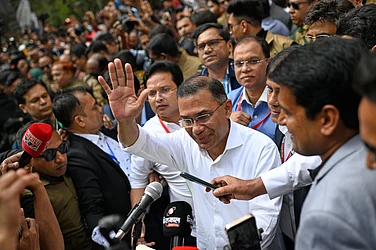An Indonesian school located on the country's main island has garnered attention as more than a dozen girls had their heads partially shaved, according to the school's headmaster's statement on Monday. The incident stemmed from accusations that the girls were wearing their Islamic hijab headscarves incorrectly. This occurrence has brought to light the ongoing debate surrounding mandatory dress codes, particularly the hijab, for both Muslim and non-Muslim girls in conservative areas of Indonesia.
The incident took place at SMPN 1, a state-owned junior high school in the town of Lamongan, East Java. Fourteen Muslim girls had their hair partially shaved by an unidentified teacher last Wednesday. The headmaster, known by the single name Harto, revealed that the school has taken action by suspending the teacher involved and issuing an apology to the affected students' parents. The root cause of the incident was related to the girls not wearing inner caps beneath their headscarves, which resulted in their hair being visible, according to media reports.
Harto clarified that while there is no mandatory obligation for female students to wear hijabs, they are advised to wear inner caps for a tidier appearance. The school expressed regret over the situation and engaged in mediation to reach an understanding with the parents. As part of the school's response, it has committed to offering psychological support to the students affected.
The incident has sparked discussions about the broader issue of religious attire in schools. Human rights advocates have called for the removal of the teacher responsible, stating that incidents like these create an intimidating atmosphere for students. Andreas Harsono, an Indonesia researcher at Human Rights Watch, noted that instances of teachers taking such actions have rarely resulted in consequences.
Reports from as early as 2021 have indicated that some schoolgirls have faced disciplinary actions, including having their hijabs cut or receiving penalties, due to not adhering to dress code rules. This issue has highlighted concerns about religious tolerance in Indonesia, a nation that recognizes six major religions and yet grapples with growing incidents of religious intolerance.


























